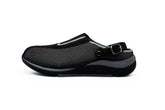Understanding the Causes of Foot Burning
Foot burning is a troubling sensation that can range from mild discomfort to intense pain, interfering with mobility and daily comfort. While it may be occasional for some, persistent burning in the feet often points to underlying health issues that require attention. Understanding the potential causes and adopting early interventions can significantly ease discomfort and prevent long-term complications.
This article explores the common causes of foot burning, suggests when to seek medical attention, and offers both at-home and clinical treatment options—especially for those managing chronic conditions like diabetes.

• Peripheral Neuropathy and Nerve Damage
Peripheral neuropathy occurs when the nerves connecting the spinal cord to the limbs are damaged, resulting in sensations such as burning, tingling, and numbness in the feet. It is commonly associated with conditions like diabetes, autoimmune diseases, infections, and reactions to certain medications. For people managing diabetes, keeping blood sugar levels stable is essential to prevent nerve deterioration.
• Diabetes and Burning Feet
Burning feet is a hallmark symptom of diabetic neuropathy, a complication of prolonged high blood sugar levels. This form of nerve damage may cause pain, numbness, and increased sensitivity. Early detection and blood sugar management can limit progression. For diabetic individuals, choosing medically designed, protective footwear—like those offered at DiabeticShoe.in—can help reduce pressure on sensitive areas, improve circulation, and promote healthier foot function.
• Vitamin Deficiencies and Their Effects
Deficiencies in vitamins B12, B6, and folate can negatively impact nerve function, leading to burning sensations. These nutrients play a vital role in maintaining healthy nerve pathways. Poor absorption, restrictive diets, or health conditions like gastrointestinal disorders can contribute to these deficiencies, making dietary awareness and supplementation under medical guidance important for nerve health.
• Alcohol Abuse and Nerve Health
Excessive alcohol intake can impair nutrient absorption and directly damage peripheral nerves, resulting in alcoholic neuropathy. Burning feet, muscle weakness, and cramps are common symptoms. Reducing alcohol consumption is essential for preventing or reversing nerve damage in such cases.
• Infections and Inflammation
Localized infections such as athlete’s foot or cellulitis can cause inflammation and burning. Autoimmune conditions like rheumatoid arthritis may also cause similar symptoms due to systemic inflammation. Timely diagnosis and targeted treatment can resolve discomfort and prevent further complications.
• Nerve Compression Issues
Nerve impingement, particularly in the lower spine, can radiate pain and burning sensations down the legs and into the feet. Sciatica is a common example. Addressing the mechanical root—whether through physical therapy, targeted exercises, or surgical interventions—can reduce or eliminate the sensation.
• Other Underlying Medical Causes
Burning feet may also be linked to less obvious conditions such as chronic kidney disease, hypothyroidism, or toxin exposure. These disrupt systemic functions and can affect nerve health. A thorough medical evaluation is often necessary to identify and treat the underlying problem effectively.
When to See a Doctor
If burning sensations persist, it’s time to consult a healthcare provider. A general physician can guide the initial assessment and refer to specialists as needed. Early intervention often leads to better outcomes and may prevent the development of more serious nerve issues.
Home Remedies That May Help
Some at-home practices may ease mild to moderate burning sensations in the feet, especially when used consistently.
Cooling Creams
Creams containing menthol or capsaicin may offer temporary relief by numbing the skin and reducing discomfort. Always test a small area first to check for skin reactions.
Warm Epsom Soaks
Soaking your feet in warm water with Epsom salt helps relax muscles and boost circulation. Adding essential oils like peppermint or eucalyptus may enhance the calming effect.
Foot Elevation
Raising your feet periodically helps reduce inflammation and swelling, relieving pressure and discomfort. This simple habit supports better blood flow and recovery.
Supportive Footwear
Wearing well-fitted, cushioned, and arch-supportive shoes can reduce nerve pressure and improve foot comfort. Footwear from DiabeticShoe.in is crafted for individuals dealing with neuropathy or foot sensitivity—ensuring comfort, breathability, and reduced friction in every step.
Dietary Adjustments
A nutrient-rich diet supports nerve health. Focus on whole foods rich in B-complex vitamins, antioxidants, and healthy fats. Consult a nutritionist or physician before starting supplements.
Steps Toward Prevention
Long-term relief from burning feet depends on sustained care and preventive habits.
-
Routine Medical Check-ups: Regularly monitor blood sugar, vitamin levels, and neurological function—especially if you’re diabetic or at risk.
-
Healthy Lifestyle: Stay active, limit alcohol, and eat a nutrient-dense diet to support nerve integrity.
-
Daily Foot Care: Keep feet clean, moisturized, and protected. Wear socks that allow airflow and change them frequently to prevent infection.
Those with diabetes should invest in quality, medically-approved footwear—like the kind available at DiabeticShoe.in—to prevent pressure sores, blisters, and long-term nerve complications.
Keep the Fire Out, One Step at a Time
Burning feet can be a sign of minor issues or serious nerve complications. Understanding the root cause—whether it’s diabetic neuropathy, vitamin deficiency, or lifestyle-induced—allows for better symptom control and long-term comfort. From cooling creams to professional care, multiple solutions are available. Pairing medical advice with preventive practices and supportive footwear can ease discomfort and restore mobility.


























